You are using an out of date browser. It may not display this or other websites correctly.
You should upgrade or use an alternative browser.
You should upgrade or use an alternative browser.
Leaked Nvidia RTX 3090 benchmark score shows performance up to 26% faster than RTX 2080 Ti
- Thread starter mongeese
- Start date
slamscaper
Posts: 278 +85
I'm not sure why everyone finds this so unbelievable. The 2080Ti is around 23% faster than a 1080Ti. So we've seen this already. You guys may just have to get over the fact that it's not going to triple your performance.
slamscaper
Posts: 278 +85
Honestly, yes according to what you've posted here it makes sense. Do the math. If you check out the 4K ultra benchmarks, in Metro Exodus and Far Cry New Dawn the 2080Ti is 25% faster in far cry and 30% faster in Metro compared to the 1080Ti. Now the 1080Ti is 45% faster than the 980Ti, but everyone knows that the 1080Ti was one of the greatest cards of the last decade, with the 8800GTX being the only other card to really hold the same value.
So if you do the math, this entirely makes sense. I don't believe anything AMD says until they launch Big Navi and we see some scores. I'm SURE Nvidia will adjust if they have to. They always leave a little wiggle room performance wise, plus driver improvements will yield more gains as well.


Honestly, yes according to what you've posted here it makes sense. Do the math. If you check out the 4K ultra benchmarks, in Metro Exodus and Far Cry New Dawn the 2080Ti is 25% faster in far cry and 30% faster in Metro compared to the 1080Ti. Now the 1080Ti is 45% faster than the 980Ti, but everyone knows that the 1080Ti was one of the greatest cards of the last decade, with the 8800GTX being the only other card to really hold the same value.
1080Ti was one of biggest disappointments of last decade. Basically 16nm version of 980Ti and nothing else. Of course not many realized this (100/100 for die shrink, never forget).
26% is not impressive at all as it can be easily achieved just from better manufacturing process with literally same architecture. So if Nvidia don't get much over that, then top end chip is disappointment.
Yes, it was disappointing to see that Pascal wasn't a significant change in architecture from Maxwell 2.0 but to claim that the 1080 Ti itself was disappointing is being somewhat disingenuous. Compare the launch test results of the GTX 1080 against the 980 Ti:1080Ti was one of biggest disappointments of last decade. Basically 16nm version of 980Ti and nothing else.
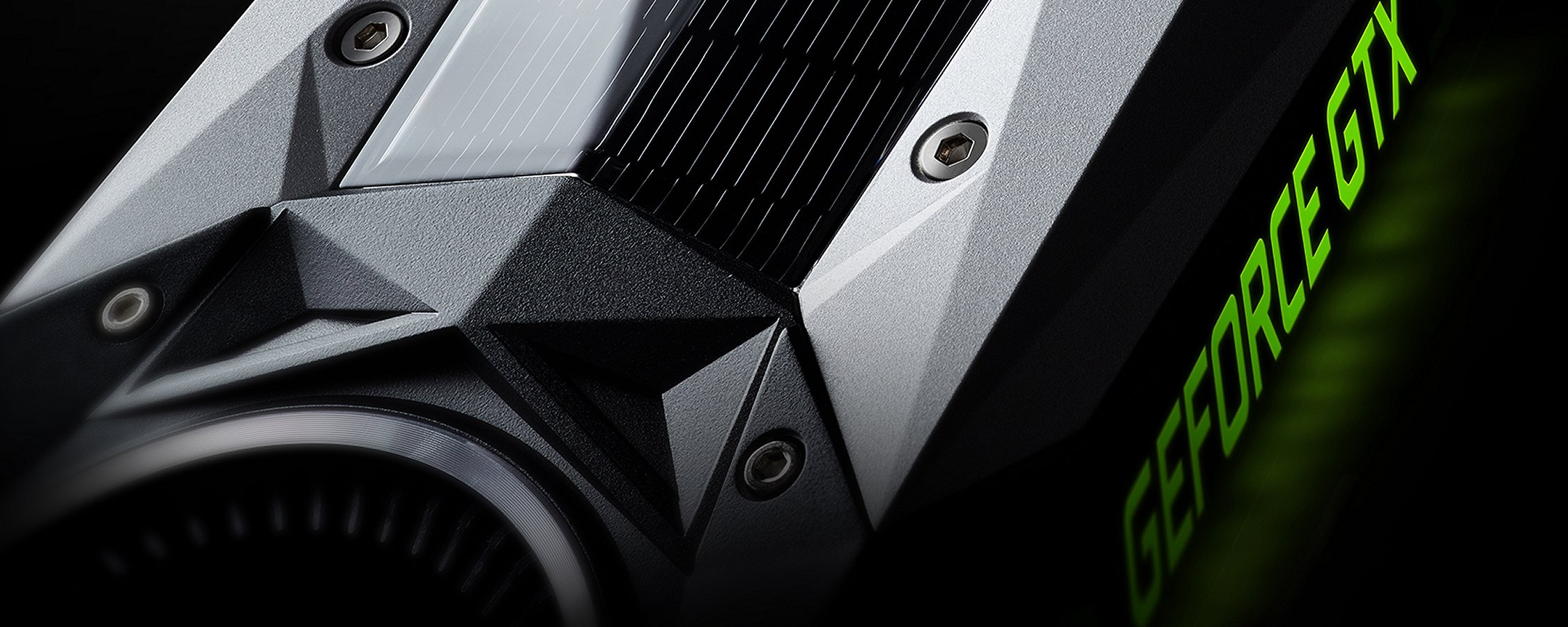
Nvidia GeForce GTX 1080 Review
First to market with a true next generation GPU is Nvidia and this could very well be the biggest step in GPU technology we've seen in recent...
 www.techspot.com
www.techspot.com
Now fast forward to a more recent examination of the 980 Ti, but this time against the GTX 1070:
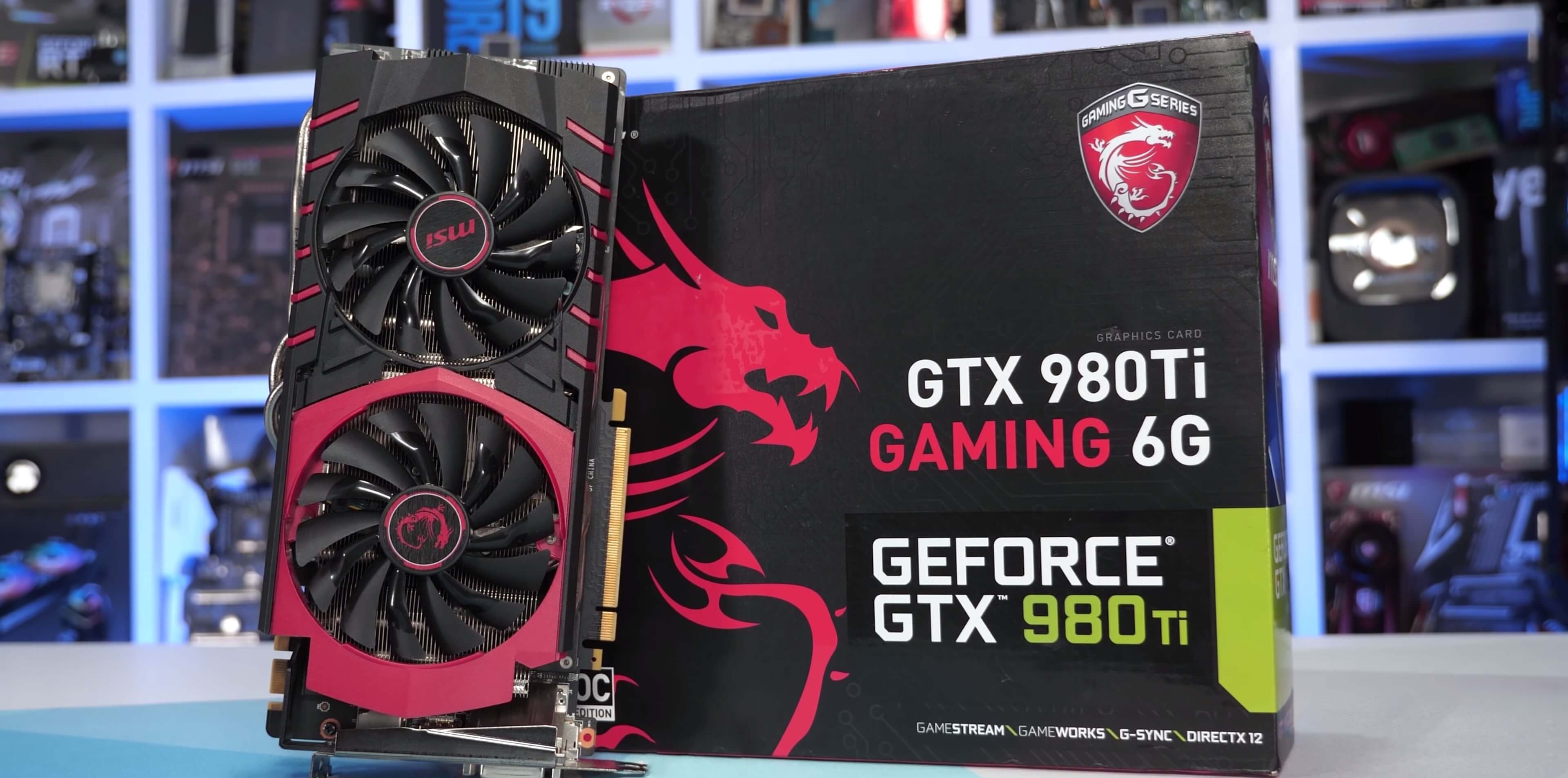
GeForce GTX 980 Ti Revisited: How does it fare against the GTX 1070 and RTX 2060?
Today we're revisiting an old friend, the GeForce GTX 980 Ti and we're doing so with a 36 game benchmark covering the 1080p and 1440p resolutions. We're...
 www.techspot.com
www.techspot.com
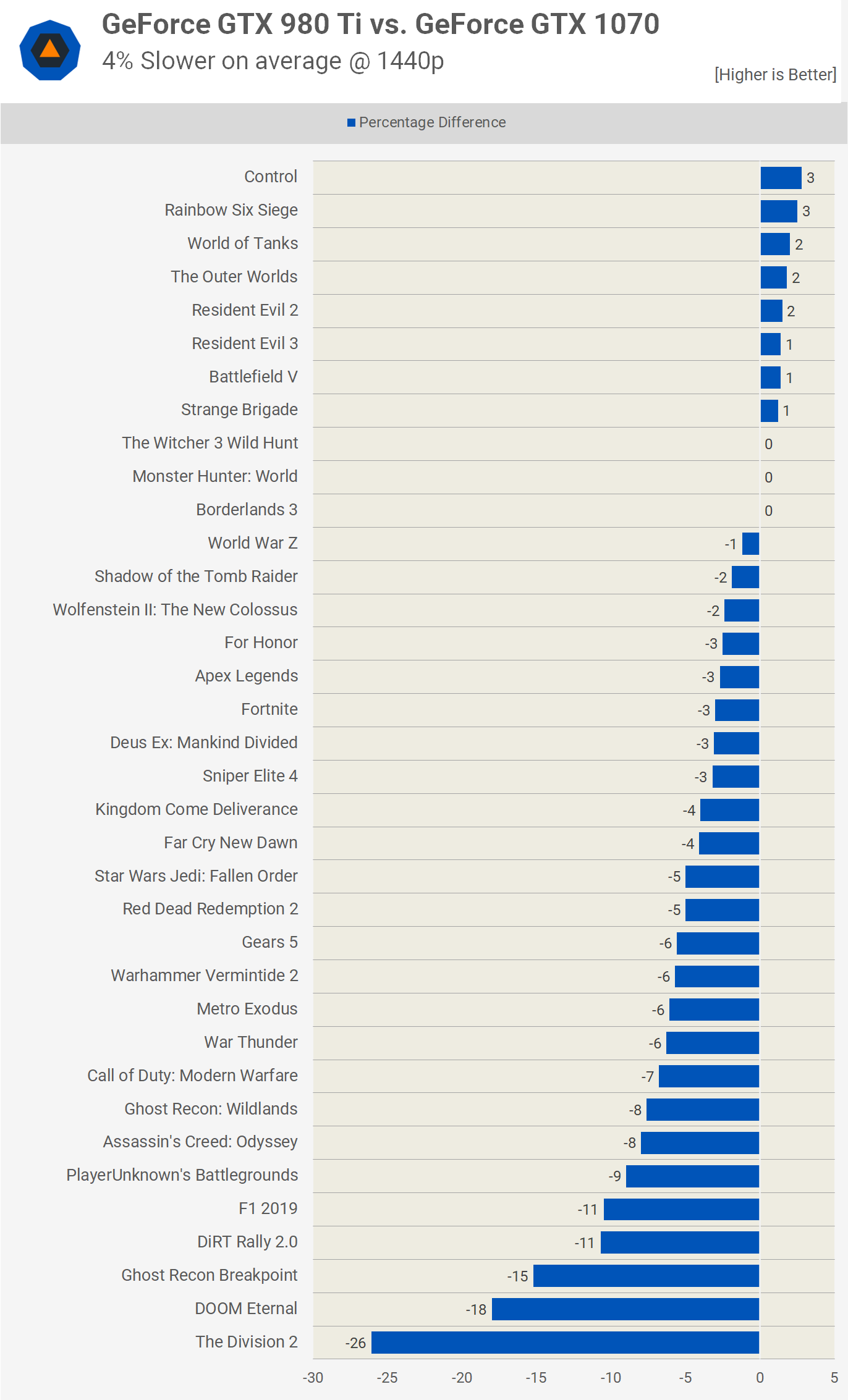
So, the 980 Ti is about the same as the GTX 1070, and notably slower than the GTX 1080. How does the 1080 Ti fair?
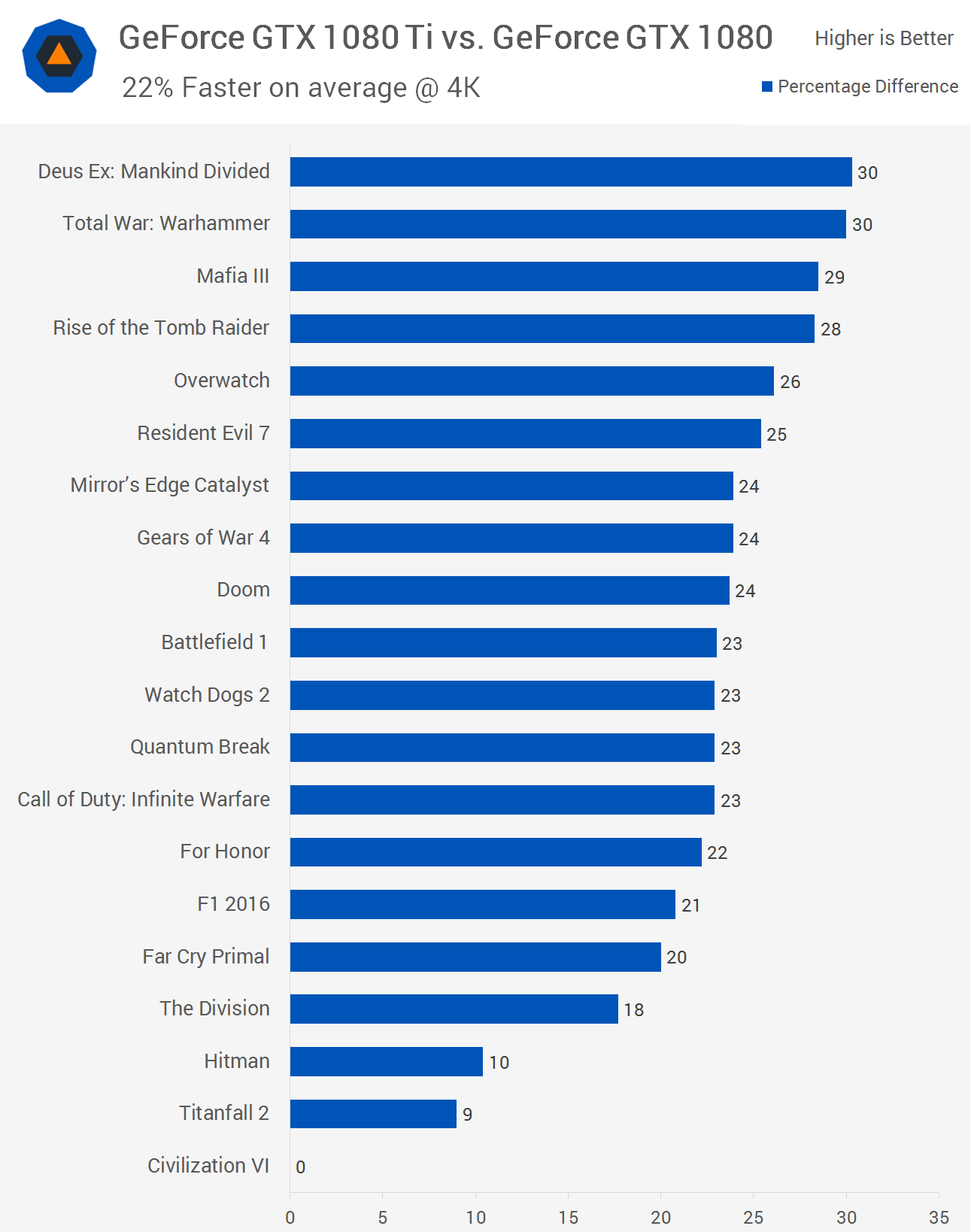
I used to have have 2 980 Ti cards in SLI, and replaced them with a single Titan X (Pascal) - ostensibly the same as a 1080 Ti:

Result
How is the performance of a single card being equal to that of 2 in a SLI-tuned test in any way disappointing?
Yes, it was disappointing to see that Pascal wasn't a significant change in architecture from Maxwell 2.0 but to claim that the 1080 Ti itself was disappointing is being somewhat disingenuous. Compare the launch test results of the GTX 1080 against the 980 Ti:
Who cares about 980Ti? When it launched it was already using manufacturing tech that was 4 years old. So basically because 1080 Ti was much better than card that basically should have belonged to museum, it's was good?

Nvidia GeForce GTX 1080 Review
First to market with a true next generation GPU is Nvidia and this could very well be the biggest step in GPU technology we've seen in recent...www.techspot.com
Now fast forward to a more recent examination of the 980 Ti, but this time against the GTX 1070:

GeForce GTX 980 Ti Revisited: How does it fare against the GTX 1070 and RTX 2060?
Today we're revisiting an old friend, the GeForce GTX 980 Ti and we're doing so with a 36 game benchmark covering the 1080p and 1440p resolutions. We're...www.techspot.com

So, the 980 Ti is about the same as the GTX 1070, and notably slower than the GTX 1080. How does the 1080 Ti fair?

I used to have have 2 980 Ti cards in SLI, and replaced them with a single Titan X (Pascal) - ostensibly the same as a 1080 Ti:

Result
www.3dmark.com
How is the performance of a single card being equal to that of 2 in a SLI-tuned test in any way disappointing?
Because that SLI-tuned card was already museum grade stuff on launch. As you already admitted, 1080 Ti is basically nothing else than die shrink of 980 Ti that used manufacturing tech from 2011. Using this "standard", we have some very interesting points:
- Upcoming GTX 3000-series (whatever it is) should not be compared against GTX 2000-series but GTX 1000-series because GTX 1000 series is (likely) using 4 year old manufacturing tech when compared to GTX 3000 series. Very much equal case as it was between GTX 1000 vs GTX 900 series.
- Intel Kaby eh Coffee Lake I mean Comet Lake is basically Skylake with little redefined manufacturing process. Using this 1080 Ti logic, Comet Lake should receive very much praise because simply moving into better manufacturing tech Should Be more than enough. (Note: I defended Intel here.)
- Intel Skylake was compared against Broadwell and Haswell. It should have been compared against something that used 4 year old manufacturing tech. That is, Sandy Bridge. Why this didn't happen, is very strange.
- Switching to AMD. With Zen2 AMD offered around 15% IPC improvement, more clock speed, much lower power consumption, compatibility to existing motherboard, PCIe 4.0 support (that Intel doesn't have full year later), double amount of cores. All these in addition to better manufacturing tech. And that was worth 90/100
- I'm not finished yet: Using same logic AMD Bulldozer made on 14nm process should have received praise, because that way it would have been just die shrink, 2011 architecture+2011 process to 2011 architecture+2015 process. AMD just wasted their efforts bringing +50% IPC improvement. Every would have been happy with just simple die shrink.
So: just because GTX 1080 Ti is much better than stuff made on museum grade manufacturing process, does not mean 1080 Ti is great. And yes, 980Ti used museum grade manufacturing tech because both TSMC and GlobalFoundries messed up. It's not very much to expect something much better than switching museum grade manufacturing tech into modern tech in more than three years (Maxwell was originally made for 20nm tech and it certainly took time to tune it for 28nm).
In short: Just when Directly comparing 1080 Ti against 980 Ti, it looks good. But considering how few things outside dis shrink it really offered, it was huge disappointment. I agree that novices do not realize these things but hey, we are talking about reputable hardware website here so I do expect something better than "yeah, die shrink, let's give 100/100!"
It's obviously relevant to the discussion, since you were the one who said:Who cares about 980Ti?
...and given that it was that particular card's immediate successor, the relative merits of the 1080 Ti should be judged against it.1080Ti was one of biggest disappointments of last decade. Basically 16nm version of 980Ti and nothing else.
At what point did I or anyone at TechSpot label the 1080 Ti an effective "100/100" because of the process node used? It achieved its score (90 out of 100) on the basis of its performance, for the price charged at the time. You are obviously perfectly at liberty to declare the 1080 Ti as "one of biggest disappointments of last decade" but I entirely disagree, irrespective of the lack of architectural changes.In short: Just when Directly comparing 1080 Ti against 980 Ti, it looks good. But considering how few things outside dis shrink it really offered, it was huge disappointment. I agree that novices do not realize these things but hey, we are talking about reputable hardware website here so I do expect something better than "yeah, die shrink, let's give 100/100!"
It's obviously relevant to the discussion, since you were the one who said:
...and given that it was that particular card's immediate successor, the relative merits of the 1080 Ti should be judged against it.
Point is that 1080 Ti looks good because it was compared to crap. That's why I gave examples why this logic is flawed.
At what point did I or anyone at TechSpot label the 1080 Ti an effective "100/100" because of the process node used? It achieved its score (90 out of 100) on the basis of its performance, for the price charged at the time. You are obviously perfectly at liberty to declare the 1080 Ti as "one of biggest disappointments of last decade" but I entirely disagree, irrespective of the lack of architectural changes.
Hmm, it seems 1080 Ti got only 90/100, it was 1080 that got 100/100. Anyway same architecture so point remains same.
Problem with this "performance and price at that time" is again that it's compared to crappy 980 Ti.
So let's rewrite history: TMSC 20nm node was successful and Nvidia launched GTX 990Ti using that tech. 16nm node is essentially 20nm node with FinFET's. That makes 990Ti closer to 1080Ti than 980Ti, but let's assume it's midway between those.
For simplicity, taking just Metro Exodus benchmarks from here: https://www.tweaktown.com/articles/9420/geforce-ti-showdown-gtx-980-vs-1080-rtx-2080/index5.html
GTX 1080 Ti: 58
GTX 1080: 45
GTX 980 Ti: 33
Yeah, GTX 1080 looks to be much faster than GTX 980 Ti and GTX 1080 Ti is almost double as fast. So based on numbers like this GTX 1080 got 100/100 and GTX 1080 Ti got 90/100.
Now, we take GTX 990 Ti into mix. As it should be in midway between 980 Ti and GTX 1080 Ti, numbers look like this:
GTX 1080 Ti: 58
GTX 1080: 45
GTX 990 Ti: 45
GTX 980 Ti: 33
Whoops, GTX 990 Ti would be as fast as GTX 1080 and only 23% slower than GTX 1080 Ti!
Now, judging from those numbers above, would you still consider 100/100 for 1080 and 90/100 for 1080 Ti to be correct?
If yes, then I would really like to hear why. If not, then my point is proven: GTX 1080 Ti got 90/100 just because it was compared to crap.
Steve based his scoring on his test figures, ones that showed the 1080 to be approximately 26% faster than the 980 Ti, on average, at 1440p and 4K; his 1080 Ti examination showed the 1080 Ti to be 22% faster, on average, than the 1080 at 4K.Yeah, GTX 1080 looks to be much faster than GTX 980 Ti and GTX 1080 Ti is almost double as fast. So based on numbers like this GTX 1080 got 100/100 and GTX 1080 Ti got 90/100.
The 980 Ti launched at $650, whereas the Founders Edition 1080 came out at $699; the vanilla version was $599. Given that it was the FE version tested, I would say that a 26% increase in performance for a 8% increase in price justifies the scoring. The 1080 Ti FE version launched at $700 (and at the same time, Nvidia dropped the standard 1080 down to $500) - different games were used to test the 1080 and 1080 Ti, so a direct comparison isn't possible.
But if the Ti remained 22% faster than 1080 in the same tests, then the 1080 Ti would have a 53% performance advantage over the 980 Ti for a price increase of 8% again (not that it stayed at that price, of course). So would I rate those cards with those scores? Yes I would - personally I'd have the 1080 Ti slightly higher.
So reviewers should ensure they judge the merits of a product, by including hypothetical items in the mix, using figures that were plucked out of the air? Or somehow judge a product to be less worthy than it appears to be, simply because the competition is worse? The truth of the matter is that the 1080 was just better than any other graphics card physically available at the time (May 2016); the same is true of the Ti version (March 2017).Whoops, GTX 990 Ti would be as fast as GTX 1080 and only 23% slower than GTX 1080 Ti! ...
GTX 1080 Ti got 90/100 just because it was compared to crap.
Steve based his scoring on his test figures, ones that showed the 1080 to be approximately 26% faster than the 980 Ti, on average, at 1440p and 4K; his 1080 Ti examination showed the 1080 Ti to be 22% faster, on average, than the 1080 at 4K.
The 980 Ti launched at $650, whereas the Founders Edition 1080 came out at $699; the vanilla version was $599. Given that it was the FE version tested, I would say that a 26% increase in performance for a 8% increase in price justifies the scoring. The 1080 Ti FE version launched at $700 (and at the same time, Nvidia dropped the standard 1080 down to $500) - different games were used to test the 1080 and 1080 Ti, so a direct comparison isn't possible.
At time review was made, GTX 980 Ti was only $429. So it was in fact 26% increase in performance while price was increased 51%. These figures hardly justify scoring. Also Nvidia's sudden price drop confirm 900-series prices were highly inflated. Even less reason to take 980 Ti launch price into consideration.
When you are buying GTX 980Ti, GTX 1080 or 1080 Ti, you don't really care what GTX 980 Ti launch price WAS years ago.
But if the Ti remained 22% faster than 1080 in the same tests, then the 1080 Ti would have a 53% performance advantage over the 980 Ti for a price increase of 8% again (not that it stayed at that price, of course). So would I rate those cards with those scores? Yes I would - personally I'd have the 1080 Ti slightly higher.
Again, GTX 980 Ti price was around $429. And that makes 1000-series to look much worse.
Because you are saying GTX 1080 and 1080 Ti scores were justified by price/performance, then...
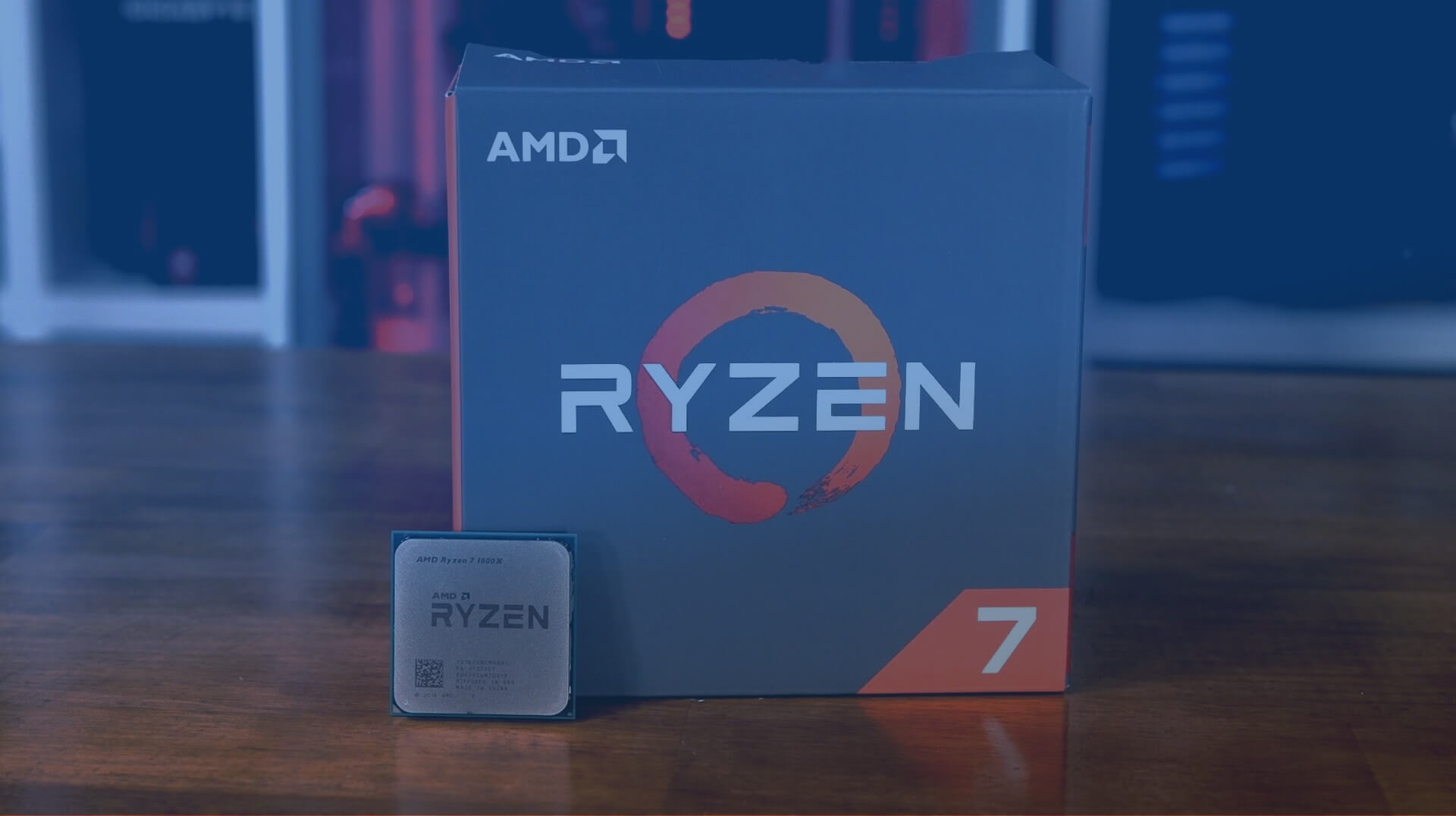
AMD Ryzen Review: Ryzen 7 1800X & 1700X Put to the Test
After more than a decade of playing underdog and years of hyping its latest undertaking, we've reached the moment of truth: AMD Ryzen processors are on our...
 www.techspot.com
www.techspot.com
Let's face it: Ryzen offers around same performance than Intel's equivalent with less than 50% of price. That's even better price/performance ratio than on GTX 1080 or GTX 1080 Ti, even when compared against 980 Ti at launch price. Still, score is only 90/100.
If we compare against predecessors (FX-8370 or FX-9590) difference is even larger. Based on price/performance alone, Ryzen should have gotten 100/100 without any questions.
This is the problem: While you have some valid points for GTX 1080 or GTX 1080 Ti scoring, they seem only apply to those reviews. When looking other reviews, standards are suddenly different. I have not much problem with 90/100 but 100/100 for just die shrink is something unbelievable.
So reviewers should ensure they judge the merits of a product, by including hypothetical items in the mix, using figures that were plucked out of the air?
Of course they should when it's reasonable. We are talking about serious hardware site here, right? This is because: if reviewer is ultimately happy with just die shrink, it also means reviewer is happy with slow development speed. But then same reviewer blames other company for not making architectural updates. Sounds good? No.
Basically your arguments about scoring have pretty funny consequences:
- Manufacturer should put launch price very high and drop it very quickly, then because next products' predecessor was very highly priced, next product will look much better. Let's compare FX-9590 vs Ryzen 7 1800X. FX-9590 launch price was $920 (dropped quickly) so needless to say Ryzen 7 1800X looks like best CPU ever will be released when we compare it against it's predecessor and consider predecessor launch price. 500$ Ryzen 1800X vs 920$ FX-9590, uuh, 200/100 at least. Btw, there is no SINGLE price comparison 1800X against any FX predecessors on article. Double standards, again.
- Manufacturer should stick with old tech long time, so that they even skip manufacturing processes. That way next product looks much better.
- Nvidia gets 100/100 when doing just die shrink. OK, what Intel got when doing die shrink and much more too? That is, 85/100 https://www.techspot.com/review/523-ivy-bridge-intel-core-i7-3770k/
So Nvidia's die shrinks seem to be much more valuable than Intel's. Or AMD's. Nvidia got more performance right, but as we know, it's very easy to get more performance on GPU with die shrink whereas on CPU's that is not even guaranteed.
Or somehow judge a product to be less worthy than it appears to be, simply because the competition is worse? The truth of the matter is that the 1080 was just better than any other graphics card physically available at the time (May 2016); the same is true of the Ti version (March 2017).
That's exactly what happens on other articles. Intel's CPU's were not receiving good scores because of what? Competition was bad so they kept development speed low but still better than Nvidia with GTX 1080 Ti.
So fastest product on market should automatically receive 100/100 or at least 90/100? Why that didn't apply on Intel CPU's past years? Most Intel's "fastest CPU on market" didn't get even 90/100 like this https://www.techspot.com/review/679-intel-haswell-core-i7-4770k/page14.html
Reading article, that is because it was so small improvement.
This is the problem with GTX 1080 and GTX 1080 Ti scores. While your arguments are somehow valid when staying those articles only, it's very clear that outside those articles arguments don't apply at all. It's clear that GTX cards got scores from something very different scoring system many other products get.
Similar threads
- Locked
- Replies
- 76
- Views
- 2K
- Replies
- 52
- Views
- 1K
Latest posts
-
The Best Handheld Gaming Consoles
- Amir Shoam replied
-
May I be overvolting my CPU despite disabling Asus APE in BIOS?
- Nelson28 replied
-
Nintendo DMCA lawyers shut down everything Mario on Garry's Mod
- Nelson28 replied
-
This Japanese vending machine dispenses Intel Core CPUs for just $3.25 a pop
- whateversa replied
-
TechSpot is dedicated to computer enthusiasts and power users.
Ask a question and give support.
Join the community here, it only takes a minute.